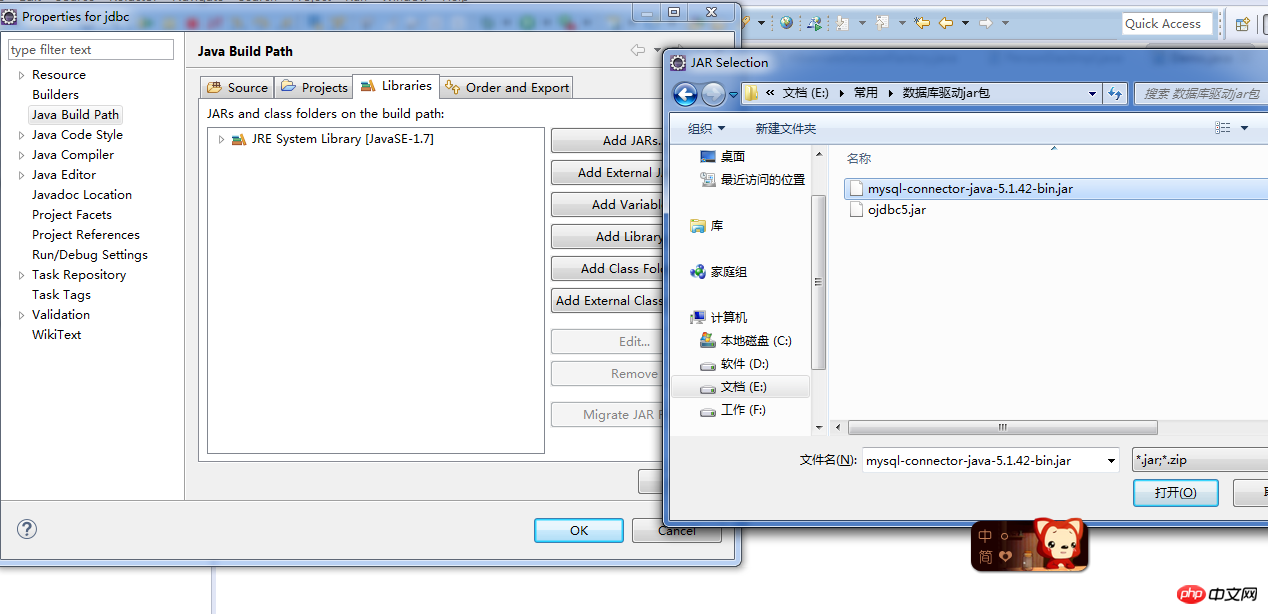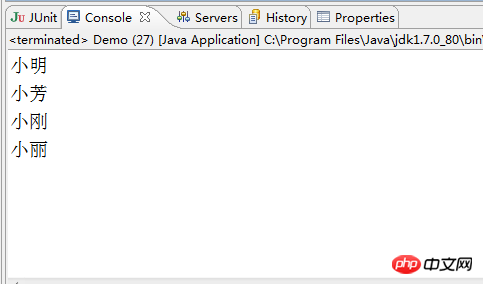
Foreword: After installing the database, the java program we write cannot directly use the database, and JDBC (Java Database Connectivity, java database connection) is an API used in the java language to standardize client programs' access to the database. With it, we can send SQL statements to various relational databases to achieve operations such as adding, deleting, modifying, and querying the database.
1. Database: Taking MySQL as an example, create a Person table with four fields: auto-incremented primary key id, name, gender, and age
1 DROP TABLE IF EXISTS `person`; 2 CREATE TABLE `person` ( 3 `id` int(11) NOT NULL AUTO_INCREMENT, 4 `name` varchar(11) DEFAULT NULL, 5 `gender` varchar(11) DEFAULT NULL, 6 `age` int(11) DEFAULT NULL, 7 PRIMARY KEY (`id`) 8 ) ENGINE=InnoDB AUTO_INCREMENT=5 DEFAULT CHARSET=utf8; 9 10 INSERT INTO `person` VALUES ('1', '小明', '男', '18');11 INSERT INTO `person` VALUES ('2', '小芳', '女', '19');12 INSERT INTO `person` VALUES ('3', '小刚', '男', '20');13 INSERT INTO `person` VALUES ('4', '小丽', '女', '21');
2. Database driver jar package: Mysql-connector-java-5.1.42-bin.jar
3 is used here .Import the driver package in eclipse: right-click the project and click Builder Path----Configure Builder Path----Add External JARs----Find the location of the jar package and select Open----Ok, and you can start doing things!
The diagram is as follows:

1 package com.jdbc.demo; 2 3 import java.sql.Connection; 4 import java.sql.DriverManager; 5 import java.sql.ResultSet; 6 import java.sql.SQLException; 7 import java.sql.Statement; 8 9 //一段完整的jdbc操作过程,后面会详细介绍,为了代码视图简洁,异常均抛出。10 public class Demo {11 12 public static void main(String[] args) throws ClassNotFoundException, SQLException {13 //第1步,注册加载驱动类14 Class.forName("com.mysql.jdbc.Driver");15 //第2步,获取数据库连接,方法中3个参数依次为:16 //url:就是你要连接的数据库的地址,不同的数据库格式会有差异17 //user:就是数据库的用户名,例如MySQL的root18 //password:数据库连接密码19 String url = "jdbc:mysql://127.0.0.1/hb?characterEncoding=utf-8";20 String user = "root";21 String password = "123123";22 Connection conn = DriverManager.getConnection(url, user, password);23 //第3步,构造语句集对象,为了简要直观,这里使用Statement,不过实际开发建议用PreparedStatement24 String sql = "select * from person";25 Statement stmt = conn.createStatement();26 //第4步,提交SQL语句,这是是查询,所以调用executeQuery方法,会返回一个集合,我们可以遍历输出其中信息;27 //如果是增删改,不同于数据库中的3种SQL语句,这里都是调用executeUpdate方法,返回的是int值28 ResultSet rs = stmt.executeQuery(sql);29 //第5步(可选),处理结果,在这里我们输出Person表中所有人名30 while(rs.next()) {31 String name = rs.getString("name");32 System.out.println(name);33 }34 //第6步,关闭相关对象,这里为ResultSet,Statement,Connection35 //注意!关闭顺序和声明顺序相反!依次如下36 rs.close();37 stmt.close();38 conn.close();39 40 }41 42 }The program running results are as follows:

java. sql.Connection:
For the connection with the database, be careful not to import the wrong package, because after importing the MySQL driver, there is also a Connection under com.mysql.jdbc. If you import this, an error will occur;
The connection is obtained by calling the getConnection method of the DriverManager class of the JDBC management layer. The last two parameters in the method are relatively simple, one user name and one password. The first parameter url format is related to each database.
MySQL: jdbc:mysql://
ORACLE:jdbc:oracle:thin:@
java,sql.Statement and java.sql.PreparedStatement
Statement objects, used to submit SQL statements;
Statement Usually used to execute static SQL statements, statement.excute(sql) can be submitted;
PreparedStatement can execute dynamic SQL statements, allowing parameterized queries, and has better performance, and can also effectively avoid SQL injection attacks. The following examples all use PreparedStatement Result set, in actual development we usually re-encapsulate the results to facilitate calling
entity class Person
1 package com.jdbc.entity; 2 //实体类Person,属性与数据库中字段对应 3 public class Person { 4 private Integer id; 5 private String name; 6 private String gender; 7 private Integer age; 8 public Integer getId() { 9 return id;10 }11 public void setId(Integer id) {12 this.id = id;13 }14 public String getName() {15 return name;16 }17 public void setName(String name) {18 this.name = name;19 }20 public String getGender() {21 return gender;22 }23 public void setGender(String gender) {24 this.gender = gender;25 }26 public Integer getAge() {27 return age;28 }29 public void setAge(Integer age) {30 this.age = age;31 }32 @Override33 public String toString() {34 return "Person [id=" + id + ", name=" + name + ", gender=" + gender35 + ", age=" + age + "]";36 }37 38 }package com.jdbc.demo;import java.sql.Connection;import java.sql.DriverManager;import java.sql.ResultSet;import java.sql.SQLException;import java.sql.Statement;public class JdbcUtil {private static String driver = "com.mysql.jdbc.Driver";private static String url = "jdbc:mysql://127.0.0.1/hb?characterEncoding=utf-8";private static String username = "root";private static String password = "hjh123";//静态代码块中注册加载驱动类static {try {
Class.forName(driver);
} catch (ClassNotFoundException e) {
e.printStackTrace();
}
}//封装获取连接方法public static Connection getConnection() {try {return DriverManager.getConnection(url, username, password);
} catch (SQLException e) {
e.printStackTrace();
}return null;
}//封装关闭对象方法public static void close(ResultSet rs, Statement statement, Connection conn) {if (rs != null) {try {
rs.close();
} catch (SQLException e) {
e.printStackTrace();
}
}if (statement != null) {try {
statement.close();
} catch (SQLException e) {
e.printStackTrace();
}
}if (conn != null) {try {
conn.close();
} catch (SQLException e) {
e.printStackTrace();
}
}
}
} 1 package com.jdbc.demo; 2 3 import java.sql.Connection; 4 import java.sql.PreparedStatement; 5 import java.sql.ResultSet; 6 import java.sql.SQLException; 7 import java.util.ArrayList; 8 import java.util.List; 9 10 import com.jdbc.entity.Person; 11 12 13 //封装Person表的增删改查方法 14 public class PersonDaoImpl { 15 //这里的问号?是占位符,用于给将要传递的参数占位置,实现了动态SQL语句的执行 16 //添加一条记录的SQL语句,第一个参数由于数据表中是主键自增,这里可以用null 17 private static final String SQL_ADD = "insert into person values(null,?,?,?)"; 18 //删除,指定id的记录 19 private static final String SQL_DEL = "delete from person where id = ?"; 20 //修改,指定id的记录 21 private static final String SQL_UPD = "update person set name = ?,gender = ?,age = ? where id = ?"; 22 //查询,指定id记录 23 private static final String SQL_ID = "select * from person where id = ?"; 24 //查询,所有记录 25 private static final String SQL_ALL = "select * from person"; 26 27 //添加一条记录 28 public boolean add(Person p) { 29 Connection conn = JdbcUtil.getConnection(); 30 PreparedStatement ps = null; 31 try { 32 ps = conn.prepareStatement(SQL_ADD); 33 //把我们传入的person对象的属性值分作为占位符的值传入,数组各值顺序对应占位符字段顺序 34 Object[] params = {p.getName(),p.getGender(),p.getAge()}; 35 int len = params.length; 36 for(int i = 0;i < len;i++) { 37 //!!!这里比较特殊,很多下标都是从0开始,例如数组, 38 //!!!但是这个setObject方法第一个索引参数是从1开始 39 ps.setObject(i+1, params[i]); 40 } 41 //这里的整型返回值line意指更新的记录数,或者说是数据库中受影响的记录行数 42 //之前的Statement.excute方法要传入SQL语句字符串参数, 43 //但是用了PreparedStatement就不用传参数了,因为在前面我们已经预定义处理了 44 int line = ps.executeUpdate(); 45 if (line > 0) { 46 System.out.println("添加成功,受影响记录数为"+line); 47 return true;//结束,但是后面finally区代码会执行 48 } 49 } catch (SQLException e) { 50 e.printStackTrace(); 51 } finally { 52 //关闭相关对象 53 JdbcUtil.close(null, ps, conn); 54 } 55 System.out.println("添加失败"); 56 return false; 57 } 58 //删除一条记录 59 public boolean delete(int id) { 60 Connection conn = JdbcUtil.getConnection(); 61 PreparedStatement ps = null; 62 try { 63 ps = conn.prepareStatement(SQL_DEL); 64 ps.setInt(1, id); 65 //这里的整型返回值line意指更新的记录数,或者说是数据库中受影响的记录行数 66 int line = ps.executeUpdate(); 67 if (line > 0) { 68 System.out.println("删除成功,受影响记录数为"+line); 69 return true;//结束,但是后面finally区代码会执行 70 } 71 } catch (SQLException e) { 72 e.printStackTrace(); 73 } finally { 74 //关闭相关对象 75 JdbcUtil.close(null, ps, conn); 76 } 77 System.out.println("删除失败"); 78 return false; 79 } 80 //修改一条记录 81 public boolean update(Person p) { 82 Connection conn = JdbcUtil.getConnection(); 83 PreparedStatement ps = null; 84 try { 85 ps = conn.prepareStatement(SQL_UPD); 86 //把我们传入的person对象的属性值分作为占位符的值传入 87 Object[] params = {p.getName(),p.getGender(),p.getAge(),p.getId()}; 88 int len = params.length; 89 for(int i = 0;i < len;i++) { 90 //!!!这里比较特殊,很多下标都是从0开始,例如数组, 91 //!!!但是这个setObject方法第一个索引参数是从1开始 92 ps.setObject(i+1, params[i]); 93 } 94 //这里的整型返回值line意指更新的记录数,或者说是数据库中受影响的记录行数 95 int line = ps.executeUpdate(); 96 if (line > 0) { 97 System.out.println("修改成功,受影响记录数为"+line); 98 return true;//结束,但是后面finally区代码会执行 99 }100 } catch (SQLException e) {101 e.printStackTrace();102 } finally {103 //关闭相关对象104 JdbcUtil.close(null, ps, conn);105 }106 System.out.println("修改失败");107 return false;108 }109 //获取一条记录,这里返回的不再是布尔值,而是一个对应数据表中一条记录的Person对象110 public Person findById(int id) {111 Connection conn = JdbcUtil.getConnection();112 PreparedStatement ps = null;113 ResultSet rs = null;114 try {115 ps = conn.prepareStatement(SQL_ID);116 ps.setInt(1, id);117 //返回结果集,这里是查询指定id,所以结果集中应该最多只有一条记录118 rs = ps.executeQuery();119 if(rs.next()) {120 Person p = new Person();121 p.setId(id);122 //这里的Result的getObject方法,参数为数据表中字段名,可以获取对应字段值123 p.setName(rs.getString("name"));124 p.setGender(rs.getString("gender"));125 p.setAge(rs.getInt("age"));126 return p;//返回p对象,结束127 }128 } catch (SQLException e) {129 e.printStackTrace();130 } finally {131 //关闭相关对象132 JdbcUtil.close(rs, ps, conn);133 }134 return null;135 }136 //获取所有记录,返回结果集不便操作,故封装到一个List中作为方法返回值137 public List<Person> findAll() {138 Connection conn = JdbcUtil.getConnection();139 PreparedStatement ps = null;140 ResultSet rs = null;141 List<Person> list = new ArrayList<>();142 try {143 ps = conn.prepareStatement(SQL_ALL);144 //返回结果集145 rs = ps.executeQuery();146 while(rs.next()) {147 //创建一个Person对象148 Person p = new Person();149 //这里的Result的getObject方法,参数为数据表中字段名,可以获取对应字段值150 p.setId(rs.getInt("id"));151 p.setName(rs.getString("name"));152 p.setGender(rs.getString("gender"));153 p.setAge(rs.getInt("age"));154 list.add(p);//添加至集合155 }156 return list;157 } catch (SQLException e) {158 e.printStackTrace();159 } finally {160 //关闭相关对象161 JdbcUtil.close(rs, ps, conn);162 }163 return null;164 }165 }The above is the detailed content of Simple example sharing about JDBC. For more information, please follow other related articles on the PHP Chinese website!
 Mechanical energy conservation law formula
Mechanical energy conservation law formula
 what is dandelion
what is dandelion
 The function of intermediate relay
The function of intermediate relay
 How to pay with WeChat on Douyin
How to pay with WeChat on Douyin
 All uses of cloud servers
All uses of cloud servers
 How to apply for a business email
How to apply for a business email
 Can Douyin short videos be restored after being deleted?
Can Douyin short videos be restored after being deleted?
 formatter function usage
formatter function usage
 How to use months_between in SQL
How to use months_between in SQL




